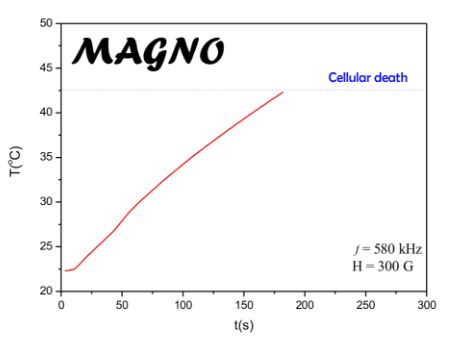| NB nanoScale Biomagnetics |

| Registration Date | 14 Sep 2017 |
| Revision Date | 14 Sep 2017 |
| Share |
Others Nanomaterials
magnetic colloidIron(II,III) oxide
Fe3O4 Nanoparticle /Nanopowder CAS Number : 1317-61-9
MAGNO is the first commercially available magnetic colloid specially designed for Magnetic nanoHeating applications.
Optimizing the heating properties of MNPs is cumbersome and takes long time and dedicated manpower. Magno offers the solution for those researchers that need accurate data, repetibility and reliability to test new ideas such as physical models, or any heating applications.MAGNO is the ideal row material for a first approximation to Magnetic nanoHeating research as well as for a great variety of advanced applications, only limited by your imagination. Covered by Polyethylenimine (PEI), MAGNO nanoparticles constitutes a powerful tool not only for basic research on power absorption but also for different applications in most fields of biomedicine.
MAGNO is a water-based magnetic colloid consisting of magnetite (Fe3O4) nanoparticles with average sizes of 25nm functionalized with a biocompatible polymer. The magnetic nanoparticles display an impressive SPA value (typically >210W/g, for f = 580KHz, H0 =300G eq to 23.877 KA/m).
MAGNO has been manufactured and synthesized under controlled conditions using the DM100 technology. The precise control of the manufacturing conditions gives MAGNO a highly reproducible heating behavior and SPA values under different conditions, and an outstanding stability over the time.
MAGNO has been developed by nB nanoScale Biomagnetics under three basic principles for inductive heating research: repetibility, traceability and reliability. Check out the full measuring technical report of Magno.
MAGNO is the best and more specific magnetic colloid for your research on inductive heating of nanoestructured materials. Do not spend your time trying to synthesize your own MNPs.